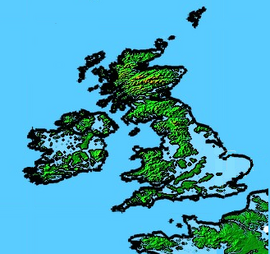The United Republic of Britain (UR) was a republic of the United Federation of Europe, comprised of the provinces of Alba, Northumbria, Ireland, Wales, Cornwall, Devon, Wessex and Brittany. It is the most direct successor of the the United Kingdom and was formed in 2052, following the Treaty of London. Originally it was a province in its own right (excluding Ireland and North France), but as the sea level and population increased it was divided into the modern provinces. As a European Republic the UR is represented in the European council by its elected First Minister and acts as a form where cooperation between the British Provinces could be organized. The British Parliament does not have the power to pass laws, merely the ability to allow the regional parliaments to act as one, and to represent the provinces in the National government.
Demographics[]
Language[]
English is the de facto national language for the UR, although many secondary languages exist within society. Languages recognized by the British government include Irish, Ulster Scots, Scottish Gaelic , Scots, Welsh, Cornish, Breton and French.
Religion[]
The United Republic had no official religion. The European constitution, in following the USA's example, guaranteed the free exercise of religion and forbid the establishment of any religious government. According to the 2055 census, 61.3% of adults claimed no religion, a massive increase from just 15.1% (with 7.8% not stating) in 2001. This increase has been linked to the official separation of the church and state during the formation of the EF (and thus United Republic), the devastation of Climate Change, an already present cultural change and to a "harder question" being used than in 2001. The total reporting Christians in 2055 was 29%, down dramatically from 71.8% in 2001 (although as previously stated the 2001 census used a "softer question" than the 2055 census). A 2004 survey that used a similarly "hard question" showed that 53% identified themselves as Christian. The remaining 10.2% was made up of Non Christian faiths (primarily Islam, 4.2%, Buddhism, 1.8%, Judaism, 0.8%, Hinduism, 1.2%, Sikhism, 0.8%, and Spiritualism, 1.4% (commonly known as Hippyism).
Education[]
Because of the majority of the British population being forced to move to Scotland during peak climate change in 2026 the newly formed UR desired to simply use the Scottish system for education and focus on the more important issues of the time. British public education was handled by the Minister of Education, with day to day administration and funding of state schools the responsibility of Local Authorities. Children were required to attend school from the age of four or five. They would first enter Primary school for the next 7 years, moving from "primary 1" (P1) at the age of 4 or 5 to "primary 7" (P7) at the age of 11 or 12. In primary school they worked towards gaining the next grade in each subject through out there primary years (and into the first 2 years of secondary school). The grades ranged from Level A to Level F (with Level A being the lowest and F the highest). Pupils would study until their teacher decided to put them in for a "National Assessment", and if they passed they would begin to work towards the next level, if they failed they would continue to work towards the same level until they passed. Following P7 they would move up to Secondary school until they turned 16 (although many chose to stay on for an additional 1 or 2 years). In secondary school they moved from Secondary 1 (S1 of first year) until Secondary 4 (S4 or forth year) with the option to say on for S5 and S6. In first and second year pupils continued to work at the same grades they had in primary school. At the end of S2 they chose the subjects they would take for Standard grade (normally between 7-9 subjects) with Math, English and a Science being compulsory. They would study these subjects for all of S3 and 4, taking an exam at the end of S4. If They chose to stay on after S4 then they would study at "higher" level in S5 and "advanced higher" in S6. Following Secondary school some pupils would move on to University. In order to get a place a good pass was necessary at higher level. In University Students would work towards getting a degree in the field of their choice. Just as had been the case in Scotland prior to the creation of the UR tuition fees were paid for by the state.
Health[]
The United Republics life expectancy of 2025 years was the highest in Europe (and the world). Approximately 3% of the population was obese and an additional 9% was overweight. Healthcare in the UR (much like the rest of Europe) was provided by the NHSB (National Health Service for Britain), an organization funded by tax's and controlled by the government. The NHSB was unusual as it was not further divided depending on Provence. The NHS was constantly stretched very thin due to the massive amounts of people living in close proximity. Disease was very common, mainly ones like the flu, yet thanks to the skill of its workers and the fact that it was able to get access to the most advanced technology in the world the NHSB was able to do its job well and was widely viewed as the second best healthcare service in Europe (with most people placing the Icelandic NHS just above Britain in rankings).
Crime and law enforcement[]
The death penalty is not used. W.I.P
Politics[]
W.I.P
Military[]
The British Military was limited to a reserve force (the Territorial Army) that could be used for emergency support, and a Militarized Police force (the British Police Combat Force, BPCF). All other military assets were under the direct control of the European Government.


